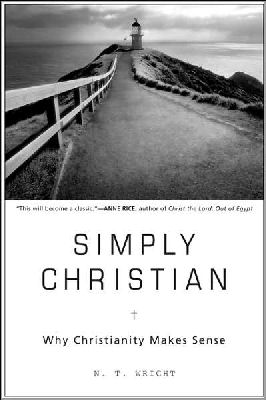
|
Posted January 18, 2007
Book: Simply Christian: Why Christianity make sense Author: N. T. Wright Harper-Collins Publishers. New York. 2006. Pp. 240 An Excerpt from the Jacket:
For two thousand years, Christianity has claimed to solve these mysteries, and this renowned biblical scholar and Anglican bishop shows that it still can today. Not since C.S. Lewisís classic summary of the faith, Mere Christianity, has such a wise and thorough scholar taken the time to explain to anyone who wants to know what Christianity really is and how it is practiced. Wright makes the case for Christian faith from the ground up, assuming that the reader has no knowledge of (and perhaps even some aversion to) religion in general and Christianity in particular. An Excerpt from the Book: We honor and celebrate our complexity and our simplicity by continually doing five things. We tell stories. We act out rituals. We create beauty. We work in communities. We think out our beliefs. No doubt you might think of more, but thatís enough for the moment. In and through all these things run the threads of love and pain, fear and faith, worship and doubt, the quest for justice, the thirst for spirituality and the promise and problem of human relationship. And if there is something as ďtruth,Ē in some absolute sense, it must relate to, and make use of, all this and more. Stories, rituals, beauty, work, belief. Iím not talking just about the novelist, the playwright, the artist, the industrialist, the philosopher. They are specialists in the different areas. Iím talking about all of us. And Iím not talking just about the special incidents ó the story of your life-changing moment, the ritual of a family wedding, and so on. Iím talking about the ordinary moments. You come home from a dayís work. You tell stories about what has happened. You listen to more stories on television or radio. You go through the simple but profound ritual of cooking a meal, laying the table doing the thousand familiar tings that say, This is who we are (or, if youíre alone, This is who I am). This is where we are ourselves. You arrange a bunch of flowers or tidy a room. And from time to time you discuss the meaning of it all. Take away any of these elements, as frequently happens ó take away stories, rituals, beauty, work, or belief ó and human life is diminished. In a million ways, small and great, our highly complex lives are made up of the interplay of these things. The multiple elements of life we noted tie them all together in an ever-changing kaleidoscopic pattern. Thatís the complex world to which the Christian story is addressed, the world of which it claims to make sense. Within that complexity, we should be careful how we use the word ďtruth.Ē Table of Contents: Part 1: Echoes of a voice 1. Putting the world to rights 2. The hidden spring 3. Made for each other 4. For the beauty of the earth Part 2: Staring at the sun 5. God 6. Israel 7. Jesus and the coming of Godís kingdom 8. Jesus: rescue and renewal 9. Godís breath of life 10. Living by the Spirit Part 3: Reflecting the image 11. Worship 12. Prayer 13. The book God breathed 14. The story and the task 15. Believing and belonging 16. New creation, starting now Afterword: To take things further . . . |
|
